Put on your hard hat and step into the lives of four Austin women taking on industries that have historically lacked a woman’s approach. From pest control to garage doors to motorcycles and general contracting, these commanding women aren’t afraid to get their hands dirty.
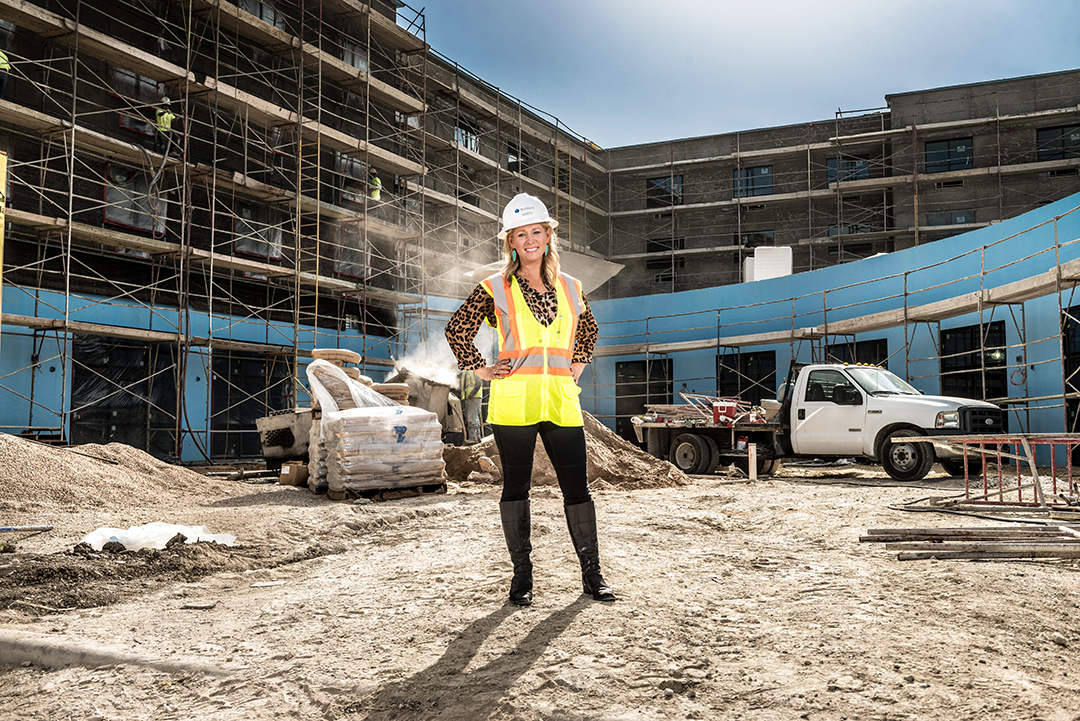 Krystal Hess operates her own company and nonprofit in the motorcycle industry, even though women make up only 14 percent of motorcycle owners in the United States. Sarah McElwee is in the business of squashing bugs, and when a pest-control company surveyed women in the trade, it found this industry has been notoriously male-dominated. Stephanie Perantoni is ascending her way to the top of the garage-service industry. While it’s well known women make the majority of home-maintenance purchases, little has been written about professional women in this field. And Kristy Attaway is making moves in the general-contracting industry. When it comes to the construction business, only 8.9 percent of this workforce is made up of women.
Krystal Hess operates her own company and nonprofit in the motorcycle industry, even though women make up only 14 percent of motorcycle owners in the United States. Sarah McElwee is in the business of squashing bugs, and when a pest-control company surveyed women in the trade, it found this industry has been notoriously male-dominated. Stephanie Perantoni is ascending her way to the top of the garage-service industry. While it’s well known women make the majority of home-maintenance purchases, little has been written about professional women in this field. And Kristy Attaway is making moves in the general-contracting industry. When it comes to the construction business, only 8.9 percent of this workforce is made up of women.
Austin Woman spoke with these women and found several commonalities. Firstly, their male-dominated industries are getting better because women like Hess, McElwee, Perantoni and Attaway are paving the way by creating a motivating and welcoming company culture. Secondly, these so-called dirty jobs weren’t necessarily their career plans. Instead, they discovered they all love the challenge of being one of, if not the only, woman in their respective companies, and have the desire to introduce more women to their industries. Lastly, these women found success in male-dominated fields by just plain working hard, really, really hard. By spending the time to learn every facet of their industries, they gained credibility, which, as these women’s stories demonstrate, is the only currency that garnered them respect.
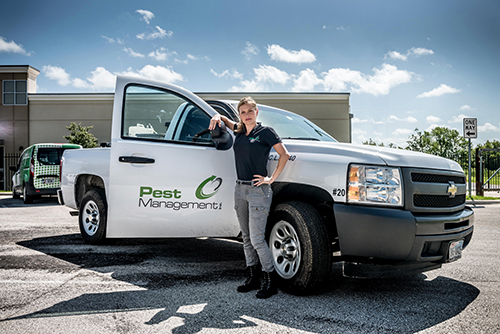
Sarah McElwee
Director of business development for Pest Management Inc. and GermLogic
“I certainly never thought I’d be doing pest control,” Sarah McElwee says.
As McElwee sits in a glass-encased conference room in South Austin, one would never guess the space houses a pest-control company. McElwee’s words are measured and eloquent as she describes her role at Pest Management Inc., where she oversees four branches in several states.
The company focuses on commercial projects, such as government contracts, and hired McElwee to seek those out. Once she was on board, the company expanded rapidly. While McElwee worked in business development in other industries, she says learning every aspect of the pest-control business proved essential, but did not come without its challenges.
One of the biggest challenges McElwee faces in her managerial role is finding trustworthy individuals and discovering ways to motivate them. Since technicians are mostly men, McElwee deals with some pushback.
“Being young and a female, they definitely look at me like, ‘There’s no way she knows what she’s talking about.’ I definitely have to earn their respect, and that comes back to me knowing the ins and outs of pest control so that I can have a conversation with the utmost educated technician and they understand that I know what they’re talking about,” she says.
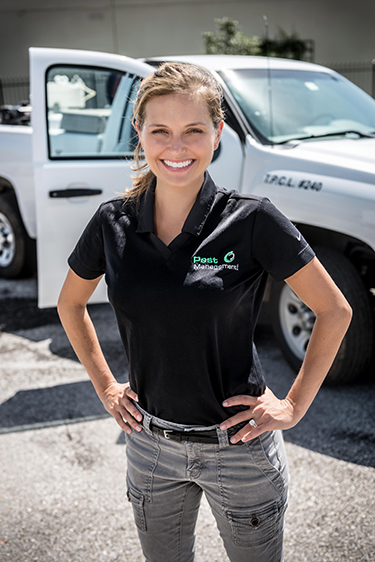
McElwee estimates about 90 percent of those she manages are men, and the remaining 10 percent who are women are typically in more administrative roles. This doesn’t appear to be a company-specific ratio; there don’t seem to be many women interested in inspecting and treating pest problems, which often requires kneeling and crawling in tight spaces. McElwee admits, as a woman, managing men can be trying and requires certain tactfulness.
“I’ve had to blatantly have conversations with managers or technicians because I felt that they didn’t want to report to me or they didn’t trust what I was saying because I would tell them one thing, and they’d literally go around me and go to my boss and ask the same exact question,” she says.
McElwee addresses these problems by being direct, and often receives a baffled response, as though the person did not realize what he was doing.
The preconceived notions of this male-dominated industry also trickle beyond the staff and into customers’ perceptions.
“I show up at homes to do pest control and people look at me like, ‘Where’s the tech?’ ” McElwee says. When she responds, ‘I am your tech,’ the customers give her a hesitant, confused look. “I can tell right off the bat, they’re going to ask a lot of questions because they want to see if I know what I’m talking about.”
McElwee takes these reactions in stride. “If it’s something up in the attic…they’re like, ‘Are you OK?’…Treat me like I’m anybody else coming in your home to perform a service. I even did it when I was pregnant. That was probably the best ever,” McElwee adds. “I wish I could’ve YouTubed people’s faces, like, ‘Is this a joke? Are we on Candid Camera?’ ”
As the mother to a 4-year-old boy, McElwee believes being one of the few women in the pest-control industry has given her great insight.
“It teaches me lessons to teach him,” she says. “There are certain things I’d want my son to grow up and do and not do.”
Since pests can’t tell time, McElwee doesn’t work the typical 9-to-5 job, which requires her to rely on her supportive husband, that is, except when it comes to dealing with bugs in the house. That’s her job.
“[Our relationship] is very opposite than most men and women,” she says.
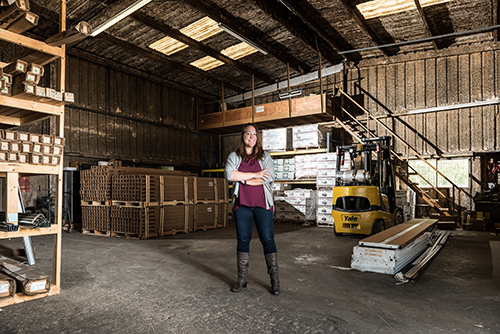
Stephanie Perantoni
Location Lead and Safety Coordinator for Precision Door Service
Tucked into an unassuming building on a large lot in North Austin sits Stephanie Perantoni’s office at Precision Door Service. Perantoni gives off a warmth and openness that seem rare for a supervisor and someone raised alongside four brothers.
Perantoni earned her bachelor’s degree in political science from Southwest Texas State University (now Texas State University), with the goal of becoming a lawyer. After graduating, she wanted to take a break. She took a risk and started a business in Phoenix, Ariz., running poker tournaments at bars.
As the business grew, Perantoni became pregnant with her first child, a son. She sold her piece of the company to her business partner and moved back to Texas. About four months after having her son, Perantoni took a job as an “after-hours phone person” at a garage-door company. The owner never expressed that the hiring decision was gender-based. Rather, he asked if she could meet the physical demands of the position, like lifting doors and carrying springs.
Eventually, the owner saw her potential and asked her to increase her hours and transition into positions of greater responsibility. At the time, Perantoni downplayed her skills, so as not to threaten her female boss. When her superior quit a couple years later and the company faced a state audit, Perantoni led the response.
“I handled it like a champ,” she says. “Now I could step up and be who I really was.”
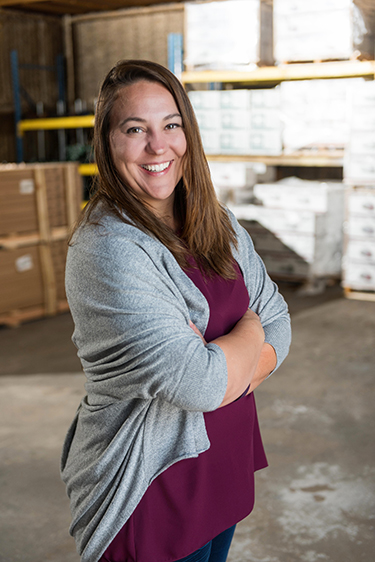
The owner of the company promoted her, but after the owner passed away, his wife sold the company to Precision Door Service. That transition came with a corporate element, and she had to work for six months before assuming the position again.
“I had to prove myself again. … There were definitely thoughts that it wasn’t a female position,” she remembers.
Now, after having her second child, another son, Perantoni has hit her stride.
“I’m in a position where they all trust me. They know that I know what I’m talking about,” she says.
Precision Door Service has multiple locations throughout the country, including in Houston and South Bend, Ind. While Perantoni’s location doesn’t necessarily sell the most volume, it does have the best numbers.
“It’s all about the culture that I built,” she says.
While working full time as a single mother, Perantoni returned to school to earn her master’s degree in teaching, with the mindset that she’d teach low-income children and make a difference. Instead, her profession has made a difference for her.
“I get a lot of self-worth from work,” she says.
While there is one other location lead who is a woman, it’s tough stuff finding females to assume traditionally male roles.
“We have women in the company, but we don’t have any women technicians. I’d love to have a woman technician,” Perantoni says. “I think they would do very well because people do have a perception of women being kinder, less likely to take advantage of you.”
When she first started, she wondered how her technicians and colleagues would respect her if she didn’t know exactly what they did. This pushed Perantoni to learn how to install a garage door, and while her staff appreciates it, she finds that respect is hinged on her leadership skills.
“It’s about how I did my job, and how we all work together,” she says. “I’m here to serve them. I can’t succeed if they’re not succeeding. … If it’s all about numbers or all about me, then they’re not going to do well. I do think that’s something I can grasp a little quicker than maybe my male counterparts can.”
Krystal Hess
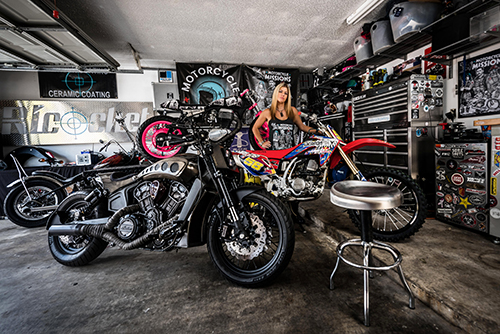
Founder of Motorcycle Missions and Owner of Ricochet Customs
Krystal Hess sets her motorcycle helmet down on the table at Buzz Mill, the 24-hour bar and coffee shop off East Riverside Drive.
“I was just here last night,” she says before talking through her career trajectory, pausing at some moments and beaming at others.
From her home, Hess operates the nonprofit Motorcycle Missions, in addition to holding down several other gigs, including nursing and her own powder-coating business. Originally from Canada, Hess moved to Austin after escaping an abusive marriage. Here, she found herself in another turbulent relationship, this one with someone who loved motorcycles. She had to talk him down from suicide. He sabotaged their relationship, including a motorcycle they had planned to rebuild.
Like that motorcycle, Hess needed rebuilding. After six months, she was left without much of anything in a new city.
“It was traumatizing,” she says.
Then, someone purchased that motorcycle from Hess, above asking price, and offered to teach her how to put it together in his shop. She spent the summer rebuilding the bike, and since then, she’s been hooked.
One day, she wanted to ride one of the bikes at the shop. The owner asked if she knew how to ride, to which she responded, “Totally.”
“I did not know how to ride,” she confesses. “I had never ridden a bike before in my life.”
She searched YouTube for how to start, shift and ride a motorcycle. Her impromptu training worked, and she didn’t crash.
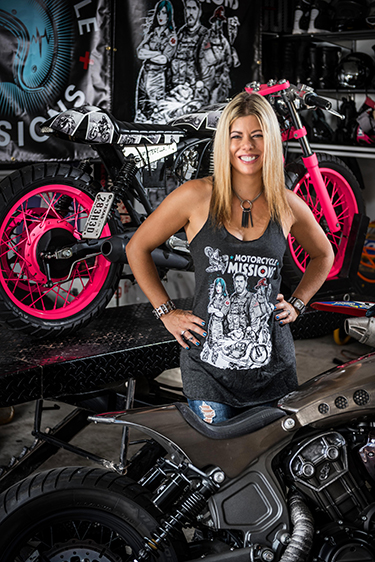
Her courage to get on that bike and go stems from an emotional place, one in which she was “starving for meaning” and “grabbing at every opportunity.”
“Getting on the motorcycle, [you]actually find something that challenges you and gets you out of your head for a while. Because you’re so focused on not dying on a motorcycle, and the movement and how it moves your body, you forget about all that other bulls–t,” Hess says.
Motorcycles helped Hess set meaningful, long-term goals. She focused on herself for once, rather than her relationships.
“It’s my time to live,” she says.
Riding a motorcycle intimidated her at first, but she gradually gained the confidence that recently led her to ride down the Pacific Coast Highway.
“That’s what it takes to grow as a person,” Hess says. “Motorcycles have helped me do that.”
Since working on bikes is no easy task and requires research, training and good, old-fashioned practice, Hess can understand why some men might have a problem with her.
“I think a girl that’s a nurse that comes in to work on motorcycles, I think it’s fair that they look at that and go, ‘Does she know what she’s doing?’ ” Hess admits.
Along the way, Hess learned how to powder coat, a technique that uses dry powder rather than traditional liquid to paint a bike. She’s powder coated for most of the dealerships throughout town, and it’s a unique skill that has been instrumental in thrusting Hess to acquire quite the fan base. And it doesn’t hurt that she hands out business cards for her company, Ricochet Customs, every week at Doc’s Motorworks’ bike night.
“A lot of people don’t take you seriously [as a woman]. Ninety-eight percent of the calls for powder coating come from guys,” Hess says.
She says her work speaks for itself.
“I know motorcycles have affected me in a very positive way. They literally changed my life. I would say they saved my life,” Hess says. “If they can help me, they can help anyone.”
That’s why she founded Motorcycle Missions, a nonprofit that provides motorcycles, gear, lessons and space to ride, all at little to no price for those who are struggling. Looking forward, Hess also plans to provide a program to those interested in building motorcycles.
Kristy Attaway

Vice president and Regional Manager at Hill & Wilkinson General Contractors
Kristy Attaway shows off the cheerful office space that Hill & Wilkinson General Contractors calls home. She’s confident, at ease.
After earning her bachelor’s degree in psychology with business foundations, Attaway thought about attending law school, but had second thoughts. During college, Attaway worked for an interior designer who specialized in workspaces. She headed to Dallas to interview for a similar position. At the same time, her now husband’s friend recommended applying for a job at Hill & Wilkinson General Contractors in Dallas.
Attaway playfully says he “nice bullied” her to interview for the position, which would require her to run a Blueline Machine, an ammonia-based system that existed before documents were able to be digitized. The job didn’t sound enticing; the environment smelled and the position required heavy lifting.
Her interviewer, now Attaway’s mentor, spent two hours discussing the $5-an-hour position, and Attaway walked away feeling like she found where she belonged.
After six months on the job, Attaway took courses at a community college on blueprint reading and estimating, which entails determining the cost based on building plans. She then went to the job site as a project engineer.
“You didn’t see women out there at all,” she says. After spending a couple years gaining experience, she headed back to the office to begin estimating. Attaway relocated to Austin, forcing her to leave the company and work for another general contractor. A couple years later, she received a call. With contracting becoming more digitized, one of the owners of Hill & Wilkinson asked if Attaway would work remotely. She said yes.
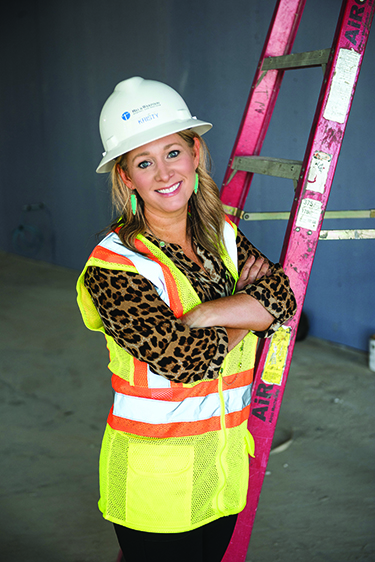
At the time, Attaway was pregnant, and then her daughter arrived six weeks early, spending a month in the neonatal intensive-care unit. The flexibility was everything to Attaway and her family. Later, she had her second child.
“There are guys who I work with still who are like, ‘I swear you must’ve shoved your kids in drawers because I never heard them,’ ” she says. “There were lots and lots of conference calls in my closet with my head between clothes trying to muffle any noise.”
An office opened in Austin, and gradually, she came into the office more often, eventually working there full time. In February 2015, she was asked to run the office, to which she answered, “I’m ready.”
At a Women in Construction boot-camp event hosted by the University of Denver, Attaway listened in shock about women’s struggles with misogyny in the field.
“I’m just lucky I fell in with a fantastic company that’s supported me, no matter what kind of role I was [in]in my life,” Attaway says.
When Attaway went on job sites early on, she admits she did get some cat calls, but also notes the atmosphere has changed quite a lot in the last decade.
Attaway perpetuates a caring company culture, from work-life balance to projects. The Austin office has a break room with weights, exercise equipment and even an area to golf, and plenty of healthy snacks.
“If a project comes around and it’s not a good fit culturally, I don’t care how much money we can make doing it, we’re not going to do it,” she says.
While Attaway works on million-dollar projects, some of the projects she’s fondest of are the most meaningful, such as a much smaller project with the Austin Humane Society and one for Armed Services YMCA in Harker Heights, Texas.

